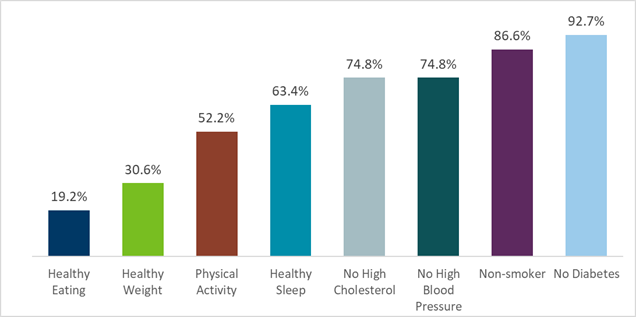News Release
Feb. 21, 2025
Know your heart health score and keep the beat
Opportunity for healthier hearts with only 4 in 10 Minnesotans having a high heart health score
During American Heart Month in February, the Minnesota Department of Health (MDH) is encouraging people to focus on their heart health and learn how they score on eight key strategies for lowering their risk for heart disease and stroke.
Also as part of hearth health month, Gov. Tim Walz proclaimed Feb. 22, 2025, as Heart Valve Disease Awareness Day (PDF) and Feb. 7-14 as Congenital Heart Defect Awareness Week (PDF) in the state of Minnesota.
“Life’s Essential 8” are the American Heart Association’s key measures for improving and maintaining cardiovascular health. The eight key measures include diet, physical activity, nicotine exposure, sleep health, body mass index or weight, cholesterol levels, blood sugar levels and blood pressure levels.
Focusing on these essential health habits is good for the heart, brain and the whole body. Cardiovascular disease and stroke are the second and fourth leading causes of death in Minnesota, accounting for 23% of all deaths in 2023.
In 2024, MDH researchers looked at adult survey results as part of a cardiovascular data story (PDF). The analysis was of the 2017 Minnesota Behavioral Risk Factor Surveillance System (BRFSS) survey, which was the most recent year with data available for all eight cardiovascular health goals.
The analysis found that about only 40% of Minnesotans were meeting benchmarks for at least six heart health goals. About half were meeting at least three goals and about 6% of Minnesotans were meeting two or fewer goals. The researchers noted that this leaves a lot of opportunity for people in Minnesota to improve their heart health.
In general, Minnesotans were doing the best at meeting goals for managing diabetes and not smoking, followed by managing blood pressure, cholesterol, sleep and physical activity, while having the most trouble with diet and healthy weight.
Percent of Minnesotans meeting cardiovascular health goals

The researchers also found the same health differences with heart health scores that are also commonly found with other health metrics. While people can feel empowered about their ability to affect their own heart health score, research has also found links between living conditions, stress and other factors that can affect one’s cardiovascular health, such as housing, access to healthy food, education, having a social support system and facing discrimination.
Minnesotans living in a household making $50,000 a year had higher heart health scores than those with less income. There were also differences based on race with white people getting the most sleep and doing slightly better on diabetes goals; Asian people doing the best with blood pressure, smoking, diet and a healthy weight; and American Indian people doing the best with physical activity.
“Achieving good heart health isn’t just about our individual choices,” said Minnesota Commissioner of Health Dr. Brooke Cunningham. “We certainly need to educate folks and each do what we can to make healthy choices, but people cannot achieve optimal cardiovascular health without access to nutritious foods, high quality care, and safe places to walk, work, and play. We also need to address stressors, such as poverty and racism, that take a toll on the body. By making sure we have healthy communities, Minnesotans can stay heart healthy and not miss a beat.”
People can learn more about their heart health score and how to make improvements at Life’s Essential 8. They can also learn their score at My Life Check.
At the community level, MDH and partners are implementing Minnesota’s Action Plan to Address Cardiovascular Disease, Stroke and Diabetes 2035 (MN 2035 Plan). This plan lays out detailed strategies and actions for communities and people to save lives, reduce health differences and improve wellbeing.
-MDH-
Media inquiries:
Scott Smith
MDH Communications
651-503-1440
scott.smith@state.mn.us